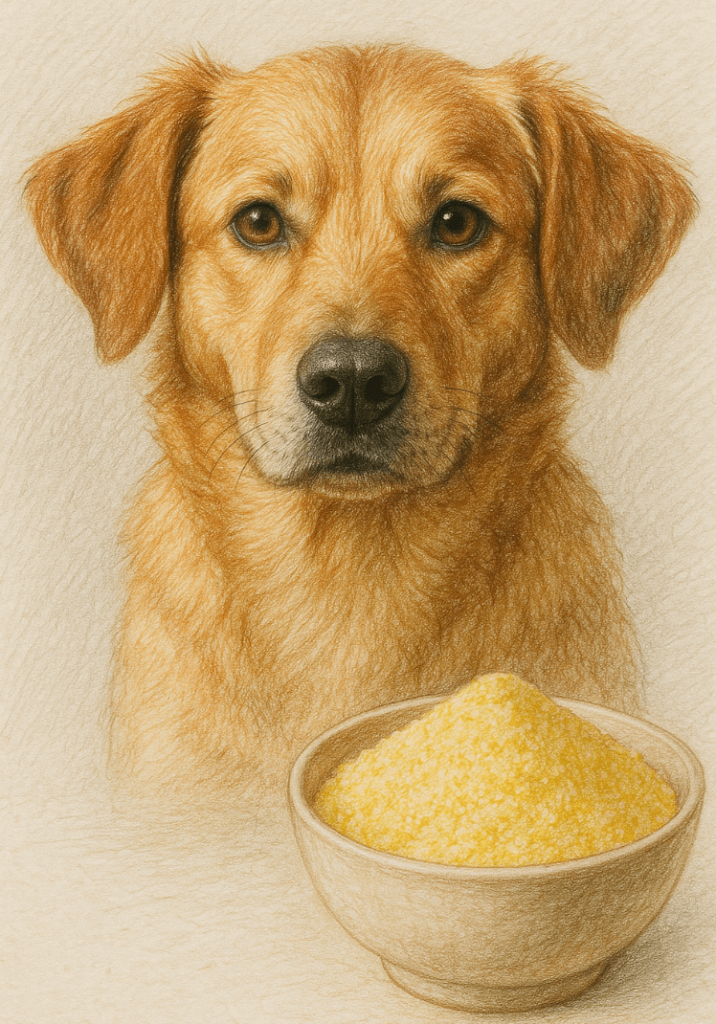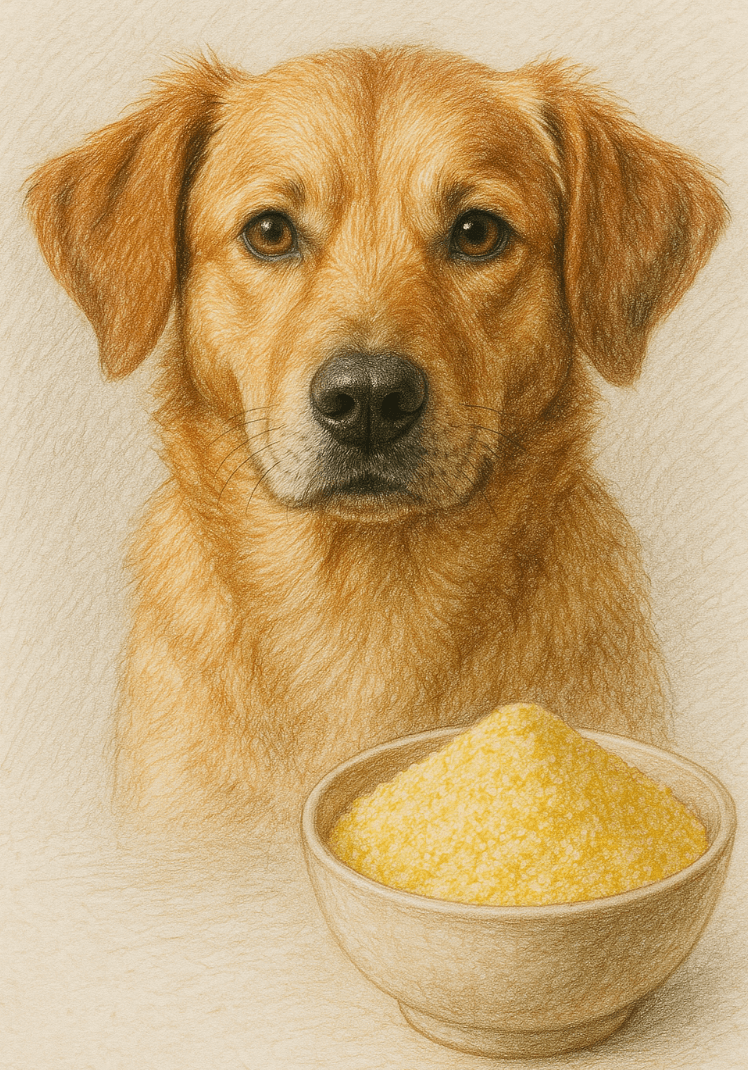Can Dogs Eat Cornmeal?
Cornmeal, a common ingredient in many human foods, often raises questions among pet owners about its safety for dogs. Whether you’re baking cornbread or preparing a dish that includes cornmeal, it’s natural to wonder if sharing a bite with your furry friend is okay. While cornmeal isn’t toxic to dogs, moderation and preparation are key to ensuring it doesn’t upset their stomachs or disrupt their balanced diet. In this blog post, we’ll explore the benefits, risks, and best practices for feeding cornmeal to your dog, helping you make informed decisions about their nutrition.
Is Cornmeal Safe for Dogs? Key Considerations
Before adding cornmeal to your dog’s diet, it’s important to understand its potential effects on their health. Here are some factors to keep in mind when deciding whether cornmeal is appropriate for your pup.
Non-Toxic but Not Essential:
Cornmeal is not toxic to dogs, but it doesn’t offer significant nutritional value compared to other ingredients like lean proteins or vegetables.Moderation is Crucial:
Feeding too much cornmeal can lead to weight gain or digestive issues due to its high carbohydrate content.Plain Preparation Only:
Avoid seasoned or buttered cornmeal, as added salt, sugar, or spices can harm your dog’s health.Allergies and Sensitivities:
Some dogs may have sensitivities to corn-based products, so monitor your pet for signs of an adverse reaction.Consult Your Veterinarian:
Always check with your vet before introducing new foods, especially if your dog has dietary restrictions or health conditions.
Understanding these considerations ensures that cornmeal is given safely and responsibly.
Potential Benefits of Cornmeal for Dogs
While cornmeal shouldn’t be a staple in your dog’s diet, it does have some potential benefits when offered occasionally and in small amounts.
Source of Energy:
Cornmeal contains carbohydrates, which can provide a quick energy boost for active dogs.Fiber Content:
The fiber in cornmeal supports healthy digestion and may help regulate bowel movements.Affordable and Accessible:
Cornmeal is widely available and cost-effective, making it a convenient option for occasional treats.Versatility in Recipes:
It can be incorporated into homemade dog treats or mixed with other safe ingredients for variety.Gluten-Free Option (if Pure):
Pure cornmeal is naturally gluten-free, which is beneficial for dogs with grain sensitivities.
These benefits highlight why cornmeal can be a useful addition to your dog’s diet when used appropriately.
Check this guide 👉Can Dogs Eat Coconut Yogurt? Best 7 Expert Tips!
Check this guide 👉Can Dogs Have Palm Oil? Best 7 Expert Tips!
Check this guide 👉Can Dogs Eat Flaxseed? Best 7 Expert Tips!

Safe Ways to Serve Cornmeal | Risks of Feeding Cornmeal Improperly |
|---|---|
Plain, unsweetened cornmeal | Seasoned or buttered cornmeal |
Mixed with lean protein | Overfeeding leading to obesity |
Baked into homemade dog treats | Digestive upset from excessive portions |
Combined with vegetables | Allergic reactions to corn-based products |
Used sparingly as a treat base | Nutrient imbalance if over-relied upon |
How to Safely Introduce Cornmeal to Your Dog’s Diet
If you decide to feed your dog cornmeal, it’s essential to do so cautiously to prevent any negative effects. Follow these steps to ensure a smooth introduction.
Start with Small Portions:
Begin by offering a teaspoon or two of plain cornmeal mixed with their regular food to gauge their tolerance.Observe for Reactions:
Watch for signs of allergies, such as itching, vomiting, or diarrhea, after introducing cornmeal.Avoid Additives:
Never include seasonings, oils, or sweeteners, as these can irritate your dog’s digestive system.Incorporate Gradually:
Mix cornmeal into their meals slowly over several days to allow their system time to adjust.Balance Their Diet:
Ensure cornmeal remains a minor part of their overall diet, prioritizing nutrient-rich foods like meat and vegetables.
By following these guidelines, you can safely incorporate cornmeal without compromising your dog’s health.
Signs Your Dog May Be Sensitive to Cornmeal
Not all dogs tolerate cornmeal well, and recognizing signs of sensitivity can help you avoid future issues. Look out for these symptoms if you suspect a reaction.
Gastrointestinal Upset:
Diarrhea, vomiting, or excessive gas may indicate that cornmeal disagrees with your dog’s system.Itchy Skin or Rashes:
Allergic reactions can manifest as skin irritation, redness, or persistent scratching.Lethargy or Discomfort:
A lack of energy or visible discomfort could signal an adverse reaction to the food.Swelling Around the Face:
Swollen lips, eyes, or face may indicate a more severe allergic response requiring immediate attention.Changes in Appetite:
Refusal to eat or sudden disinterest in meals might suggest intolerance to cornmeal.
Identifying these signs early allows you to remove cornmeal from their diet and consult your vet promptly.
Common Mistakes to Avoid When Feeding Cornmeal
Feeding cornmeal to your dog requires attention to detail to avoid mistakes that could harm their health. Here are some pitfalls to steer clear of.
Overfeeding Cornmeal:
Too much cornmeal can lead to weight gain and nutrient imbalances in your dog’s diet.Adding Harmful Ingredients:
Salt, sugar, butter, or spices can upset your dog’s stomach or cause long-term health issues.Ignoring Allergy Signs:
Failing to recognize allergic reactions may worsen your dog’s condition and delay treatment.Using Cornmeal as a Main Ingredient:
Relying on cornmeal instead of nutrient-dense foods deprives your dog of essential vitamins and minerals.Skipping Veterinary Advice:
Introducing new foods without consulting your vet can lead to unintended consequences.
Avoiding these mistakes ensures your dog stays healthy and happy.
Healthier Alternatives to Cornmeal for Dogs
If you’re looking for nutritious substitutes for cornmeal, consider these healthier options that provide greater benefits for your dog’s diet.
Brown Rice:
A fiber-rich grain that supports digestion and provides sustained energy.Quinoa:
Packed with protein and amino acids, quinoa is a superfood that enhances your dog’s overall health.Sweet Potatoes:
High in fiber and vitamins, sweet potatoes are a tasty and nutritious alternative.Oats:
Easily digestible and rich in fiber, oats promote heart health and regulate blood sugar levels.Pumpkin:
Low in calories and high in fiber, pumpkin aids digestion and helps manage constipation or diarrhea.
These alternatives offer more nutritional value than cornmeal, making them excellent choices for your dog’s meals.
Fun Ways to Incorporate Cornmeal into Dog Treats
If you want to include cornmeal in your dog’s diet, try these creative and safe recipes for homemade treats.
Cornmeal Biscuits:
Combine plain cornmeal, eggs, and water to create simple baked biscuits your dog will love.Peanut Butter Cornmeal Cookies:
Mix cornmeal with unsweetened peanut butter and bake for a tasty, protein-packed snack.Cheese and Cornmeal Muffins:
Use shredded cheese and cornmeal to make savory muffins that are both filling and flavorful.Vegetable-Infused Cornmeal Patties:
Add grated carrots or zucchini to cornmeal patties for extra nutrients and texture.Freeze-Dried Cornmeal Snacks:
Blend cornmeal with water, shape into small bites, and freeze for refreshing summer treats.
These ideas allow you to experiment with cornmeal in fun and safe ways while keeping your dog’s diet exciting.
Frequently Asked Questions About Feeding Cornmeal to Dogs
Can puppies eat cornmeal?
Yes, but only in small amounts and under supervision, as their digestive systems are still developing.
Is cornmeal better than corn kernels for dogs?
Cornmeal is easier to digest than whole kernels, which can pose a choking hazard or be difficult to break down.
What should I do if my dog accidentally eats seasoned cornmeal?
Monitor them closely for symptoms of distress and contact your vet if they show any adverse reactions.
Can cornmeal replace grains in my dog’s diet?
No, cornmeal lacks the nutritional density of other grains and should not be relied on as a primary food source.
Are there healthier alternatives to cornmeal for dogs?
Yes, options like brown rice, quinoa, or sweet potatoes provide more nutrients and fiber for dogs.
Making Informed Choices About Cornmeal for Your Dog
While cornmeal isn’t inherently harmful to dogs, it’s important to approach it as an occasional treat rather than a dietary staple. By understanding its benefits, risks, and proper preparation methods, you can ensure your dog enjoys it safely without compromising their health. Always prioritize a balanced diet rich in high-quality proteins, vegetables, and grains tailored to your dog’s specific needs. Remember, your veterinarian is your best resource for personalized advice on your dog’s nutrition. With careful consideration, you can provide your furry friend with a varied and wholesome diet that keeps them happy and healthy.
Do Cats Have Taste Buds? Best 7 Expert Tips! – Discover how cats experience flavors and why their taste is so unique.
Do Dogs Have Taste Buds? Best 7 Expert Tips! – Discover how dogs experience taste, their preferences, and what it means for their diet and health.
Can Cats Taste Sweet? Best 7 Expert Tips! – Discover why cats can’t taste sweetness, how it affects their diet, and tips to keep them healthy and happy.
Can Dogs Taste Sweet? Best 7 Expert Tips! – Discover how dogs perceive sweetness, which foods are safe, and tips to manage their sweet cravings responsibly.





